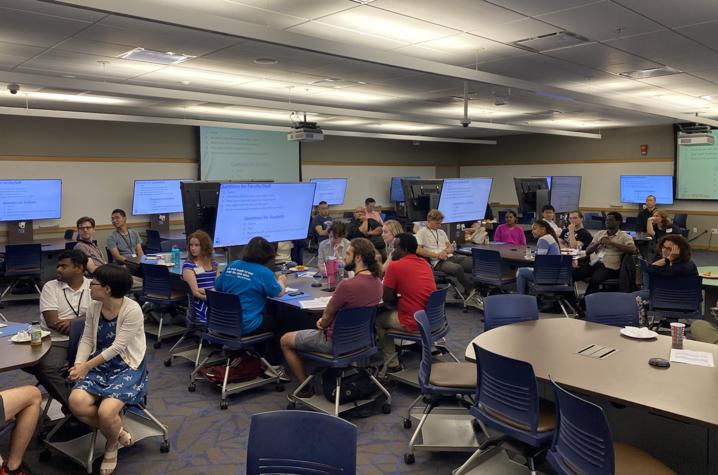New bachelor’s degree in statistics and data science addresses growing data-driven industries

LEXINGTON, Ky. (Jan. 8, 2024) — The Dr. Bing Zhang Department of Statistics at the University of Kentucky is now offering, for the first time, an undergraduate major for students, addressing a growing demand for skilled professionals in data-driven industries.
Approved by the Kentucky Council on Postsecondary Education in the fall, the new Bachelor of Science in statistics and data science will equip students to execute all stages of data analysis, from acquisition and exploration to application of statistics and machine learning methods for the creation of data.
As businesses and organizations increasingly rely on data to make informed decisions, there has been a surge in the demand for more people who are trained to make sense of data. UK is meeting this demand by launching the new undergraduate major.
“The program prepares students to enter the workforce directly, or with our specialization in statistical theory, as strong candidates for graduate school in statistics,” said William Rayens, department chair. “More generally, all students will be well-prepared for roles in other data-driven fields.”
Professions in this field include data scientists, statisticians, business and financial analysts, cost estimators, actuaries, data engineers, sports statisticians, and data strategists, to name a few.
Since its founding, the Dr. Bing Zhang Department of Statistics at UK has offered both master’s and doctoral degrees, as well as a graduate certificate and an undergraduate minor. The new statistics and data science major will be the department’s first bachelor’s degree program.
“Our department was formed in 1967 and became nationally recognized for its research, graduate programs and extensive undergraduate service teaching,” Rayens said. “The faculty now want to step up and do our part to meet the increasing demand for statistics majors. We are honored to join the other universities in the state that are already offering excellent programs and already doing their parts to address this demand.”
The major consists of a total of 41 credit hours, not including prerequisites or pre-major courses. Twenty-nine of those hours are prescribed and 12 are designed to allow specializations chosen by the student, in consultation with the director of undergraduate studies. These flexible specializations will allow students from a variety of backgrounds to complete the major with an approved specialty of their choosing and will also make it easier for students to double major.
The program culminates in a capstone course that connects majors with real-data projects in the Predictive Analytics and Data Science Hub, based in the department, which has been used to connect faculty and students to grants and contracts around campus and throughout the state.
“We have used the Hub to create multiple research collaborations at the University of Kentucky, and beyond,” Rayens said. “This will be a rich source for capstone projects.”
Students are now eligible to declare the major, and the first cohort will begin this fall.
For more information, email stat-dus@uky.edu, or contact Melissa Pittard, director of undergraduate studies, at melissa.pittard@uky.edu.
As the state’s flagship, land-grant institution, the University of Kentucky exists to advance the Commonwealth. We do that by preparing the next generation of leaders — placing students at the heart of everything we do — and transforming the lives of Kentuckians through education, research and creative work, service and health care. We pride ourselves on being a catalyst for breakthroughs and a force for healing, a place where ingenuity unfolds. It's all made possible by our people — visionaries, disruptors and pioneers — who make up 200 academic programs, a $476.5 million research and development enterprise and a world-class medical center, all on one campus.




